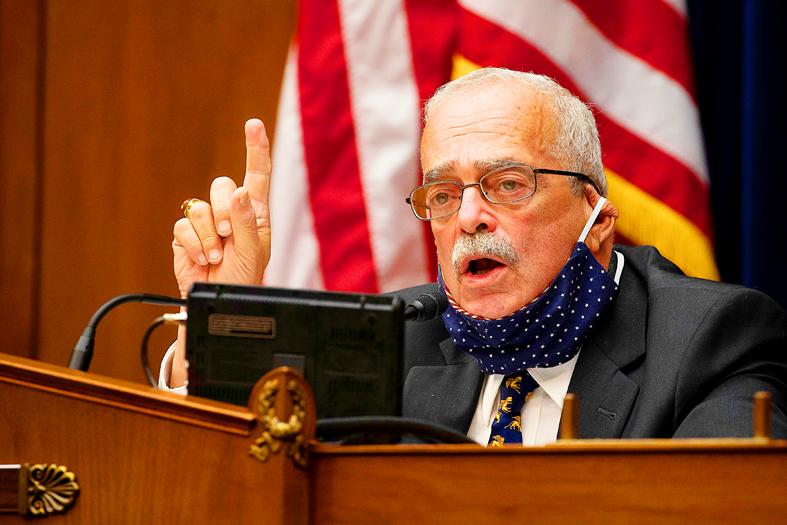A bipartisan coalition of US congressmen on Monday introduced legislation that aims to counter China’s claim to represent Taiwan in international organizations.
“For too long, Beijing has distorted policies and procedures at the UN and related bodies to assert its sovereignty claims over Taiwan, often to the detriment of global health and security efforts,” US Representative Gerry Connolly said in a news release.
“This bipartisan legislation ensures that we stand in solidarity with this critical US partner,” he said.

Photo: Reuters
Connolly cosponsored the bill with the three other chairs of the Congressional Taiwan Caucus — US representatives Albio Sires, Mario Diaz-Balart and Steve Chabot — along with US Representative John Curtis and US Representative Ami Bera, who chairs the foreign affairs subcommittee on Asia.
According to a draft provided by Curtis’ office, the “Taiwan International Solidarity Act” foremost aims to clarify the content of UN General Assembly Resolution 2758, which recognizes the People’s Republic of China (PRC) as “the only legitimate representative of China” in the UN.
The 1971 resolution says nothing about Taiwan’s representation in the UN or related organizations, nor does it declare a stance on the relationship between the PRC and Taiwan, the draft says.

Photo: AFP
The PRC has long used the resolution “as a pretext to bully the international community into supporting its bogus sovereignty claims over Taiwan and its ‘one China’ principle, despite the fact the resolution does not address Taiwan’s status,” Chabot said.
This has led to Taiwan’s exclusion from organizations such as the WHO, Interpol and the International Civil Aviation Organization, he added.
Whenever appropriate, US representatives should use their voice, vote or influence to resist Chinese attempts to “distort the decisions, language, policies or procedures of such organizations regarding Taiwan,” the draft says.
It also declares US opposition to any attempts to change Taiwan’s status without the consent of the Taiwanese people.
The bill would amend the Taiwan Allies International Protection and Enhancement Initiative (TAIPEI) Act of 2019, which instructs the US to advocate for Taiwan’s participation in such organizations.
“The TAIPEI Act has greatly strengthened our relationship with Taiwan... However, since the bill’s signing last year, China has mounted pressure on international organizations to claim that Taiwan is part of China,” Curtis said. “This bill adds to the TAIPEI Act in a way that would counter these attempts.”
One addition would instruct the US to encourage its partners to oppose Chinese efforts to undermine Taiwan’s official and unofficial relations with other countries.
This would strengthen a provision in the TAIPEI Act that instructs the US to support Taiwan’s efforts to bolster its global partnerships.
The bill would also instruct the US secretary of state to detail in their annual report past and current efforts by China to weaken Taiwan’s participation in international organizations.
This adds to the TAIPEI Act provision instructing the US Department of State to report to Congress annually on its efforts to bolster Taiwan’s global partnerships.
The bill is to be deliberated in the US House of Representatives Committee on Foreign Affairs before it is presented to the entire House for a vote. If it passes, it would be sent to the US Senate for approval before the president can sign it into law.
The Ministry of Foreign Affairs (MOFA) yesterday welcomed the proposal, saying it would pay close attention to its progress.
Ministry spokeswoman Joanne Ou (歐江安) thanked the US Congress for its continuous and concrete efforts to support Taiwan.
The government would maintain close communication with its friends on Capitol Hill and in the US administration, and seek more opportunities for collaboration, she told a regular news conference.

MAKING WAVES: China’s maritime militia could become a nontraditional threat in war, clogging up shipping lanes to prevent US or Japanese intervention, a report said About 1,900 Chinese ships flying flags of convenience and fishing vessels that participated in China’s military exercises around Taiwan last month and in January last year have been listed for monitoring, Coast Guard Administration (CGA) Deputy Director-General Hsieh Ching-chin (謝慶欽) said yesterday. Following amendments to the Commercial Port Act (商港法) and the Law of Ships (船舶法) last month, the CGA can designate possible berthing areas or deny ports of call for vessels suspected of loitering around areas where undersea cables can be accessed, Oceans Affairs Council Minister Kuan Bi-ling (管碧玲) said. The list of suspected ships, originally 300, had risen to about

DAREDEVIL: Honnold said it had always been a dream of his to climb Taipei 101, while a Netflix producer said the skyscraper was ‘a real icon of this country’ US climber Alex Honnold yesterday took on Taiwan’s tallest building, becoming the first person to scale Taipei 101 without a rope, harness or safety net. Hundreds of spectators gathered at the base of the 101-story skyscraper to watch Honnold, 40, embark on his daredevil feat, which was also broadcast live on Netflix. Dressed in a red T-shirt and yellow custom-made climbing shoes, Honnold swiftly moved up the southeast face of the glass and steel building. At one point, he stepped onto a platform midway up to wave down at fans and onlookers who were taking photos. People watching from inside

Japan’s strategic alliance with the US would collapse if Tokyo were to turn away from a conflict in Taiwan, Japanese Prime Minister Sanae Takaichi said yesterday, but distanced herself from previous comments that suggested a possible military response in such an event. Takaichi expressed her latest views on a nationally broadcast TV program late on Monday, where an opposition party leader criticized her for igniting tensions with China with the earlier remarks. Ties between Japan and China have sunk to the worst level in years after Takaichi said in November that a hypothetical Chinese attack on Taiwan could bring about a Japanese

The WHO ignored early COVID-19 warnings from Taiwan, US Deputy Secretary of Health and Human Services Jim O’Neill said on Friday, as part of justification for Washington withdrawing from the global health body. US Secretary of State Marco Rubio on Thursday said that the US was pulling out of the UN agency, as it failed to fulfill its responsibilities during the COVID-19 pandemic. The WHO “ignored early COVID warnings from Taiwan in 2019 by pretending Taiwan did not exist, O’Neill wrote on X on Friday, Taiwan time. “It ignored rigorous science and promoted lockdowns.” The US will “continue international coordination on infectious